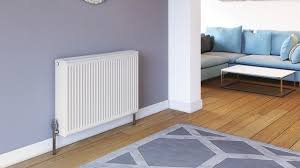Published on September 14th, 2023
Can heat pumps work with my existing radiators?
One popular misconception is that heat pumps have numerous special requirements to function properly and deliver an optimal performance. For instance, it has been suggested that only properties with underfloor heating and premium insulation are suitable homes for heat pumps. Whilst typically, both elements would play a part in providing a good setting for a heat pump installation, they are not absolutely essential features to ensure it will work correctly.

Can heat pumps operate with my existing radiators?
In short, yes. Both ground source heat pumps and air source heat pumps will work with existing radiators, though there are concerns surrounding the maximum output temperature that heat pumps can achieve.
One popular misconception is that heat pumps have numerous special requirements to function properly and deliver an optimal performance.
For instance, it has been suggested that only properties with underfloor heating and premium insulation are suitable homes for heat pumps.
Whilst typically, both elements would play a part in providing a good setting for a heat pump installation, they are not absolutely essential features to ensure it will work correctly.
Indeed, radiators can work well with heat pumps and, in most cases, existing radiators won’t even need replacing if a heat pump is chosen to replace a gas boiler or alternative fossil fuel heating solution.
But with the UK government determinedly encouraging households to follow this path and embrace renewable heating options, it’s best to be able to understand what capabilities your existing radiators would need to facilitate heat pumps.
How can I tell if my existing radiators will work with a heat pump?
Right from the start, the very best way to determine whether or not your existing radiators will work with a heat pump is to enlist the services of a heat pump engineer.
Such a professional will be able to accurately calculate the suitability of the radiators, and tell if they’ll be able to work to their full capacity and adequately heat the home. Furbnow can help you find the right installer as part of the Project Management service.
Heating engineers can also advise if additional heating devices such as heated towel rails might be required to supplement the level of heat output, or if an altogether different vice such as underfloor heating might prove a better option.
Essentially, considering that low flow temperatures are typical of heat pumps, the surface area that delivers warmth generally needs to be larger than it would do when powered by a gas or oil boiler.
If you have particularly large, powerful radiators already installed, you are unlikely to encounter any issues.
And the probability that your current hot water radiators will remain suitable for heat pumps also increases if they incorporate a low water content. Such radiators are ideally suited to heat pump systems given that they take a while longer to warm up, but deliver an excellent heat output when they do.
Are radiators the best option to use with heat pumps?
In some cases, radiators will be a very appealing option to team with heat pumps. And if you’re forking out to switch from a gas boiler to a heat pump, the prospect of keeping your existing radiators in place might be an especially appealing one.
However, radiators cannot necessarily be considered the very best option to complement the performance of air source heat pumps or ground source versions from an energy efficiency perspective.
So what is the best home heating device to team with heat pumps and do you need to change your radiators for a heat pump to work properly?
Given that a large heating surface area is required to achieve comfortable temperatures with both types of heat pump, underfloor heating is widely considered to be an excellent means for transmitting impressive warmth throughout the home, even if it might take a little while to do so.
All in all, a household featuring underfloor heating, in addition to complementary sizeable designer radiators or alternative smaller heating devices like towel rails, could be considered to make up the perfect setup for heat pumps.
Written by

Oisin Teevan